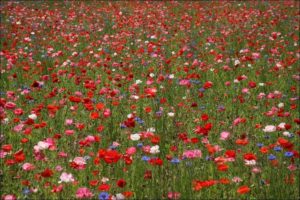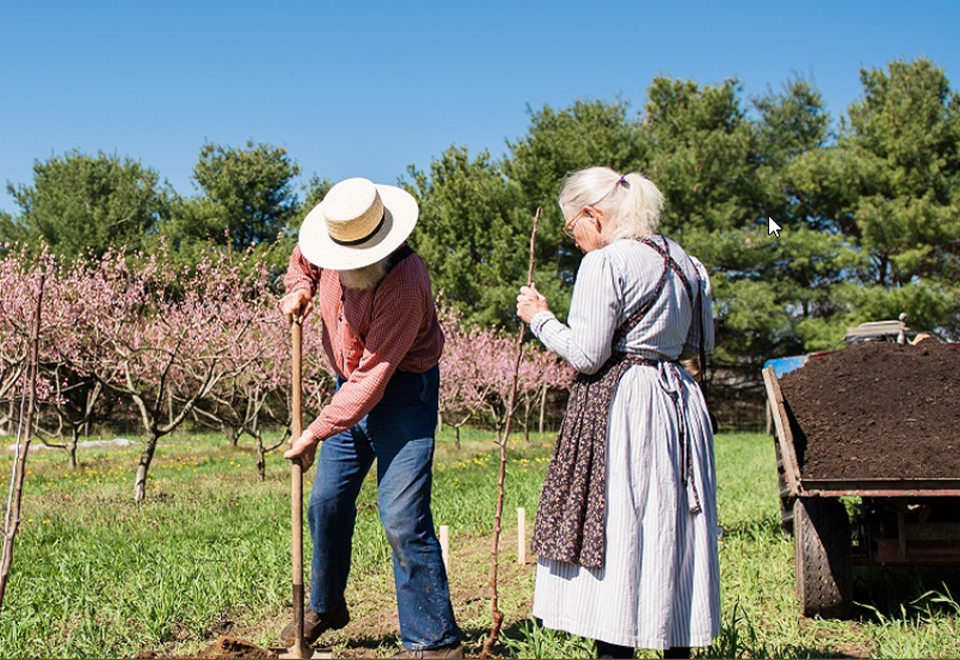If there’s a universally loved fruit, it just might be the blueberry. It’s as fun to eat as food gets—popping those purplish little orbs into your mouth by the handful is symbolic of summertime goodness. And where else in the organic world do we get to eat the color blue? Outside of the processed food aisles, it’s a rare and welcome sight—one that Pleasant Hill Farm has been focused on for 40 years.
Husband and wife team John Van Voorhees and Joan Donaldson began their foray into organic blueberry farming as a team in Fennville, a small Western Michigan town (also known for its wine). John is a third-generation farmer who cultivates bushes planted by his grandfather, and Joan is the granddaughter of a fruit farmer, so farming was naturally in the cards for the couple. They came to organic farming shortly after they were married, says Joan.
“An older friend gave us some copies of Organic Gardening and Farming and through Rodale’s magazine we were introduced to the writings of Louis Bromfield about his organic practices on Malabar Farm,” Joan recalls. “Wendell Berry also wrote articles for Rodale about his farm and philosophies about agriculture that inspired us to ponder what type of farm did we envision on our land?” Berry’s classic book, The Unsettling of America: Culture & Agriculture, further shaped their agrarian worldview.
Also during this period, Organic Growers of Michigan organized. “Through the meetings and relationships, we all encouraged each other to strive for sound organic stewardship,” says Joan.
The effort has paid off for the couple. With sweet blueberries that have devoted fans, scores of people have come to associate the season with blueberries from Pleasant Hill Farm. Locals can find them at co-ops and natural foods grocers or by visiting the farm directly, where picking your own berries is half the fun. For the rest of us, we can order direct—yes, Pleasant Hill will ship you fresh-frozen berries anywhere in the US. Because of the high organic content of the soil, and the years of sustainable farming, John and Joan say their blueberries are extra sweet and intensely flavorful. The couple is also experimenting with day-neutral strawberries (a crop that produces fruit throughout the season), which they are planting in a low tunnel.
But farm life hasn’t always been easy at Pleasant Hill. “There have been difficult moments when battling diseases or various fruit pests when John and I wondered if we could continue farming organically and make a decent living,” Joan explains. “But we always returned to our calling to build healthy soils and plants so that we can provide the healthiest fruit possible.”
And it’s not just for those baskets of blueberries they’re selling today, she adds. The plan is to leave a soil legacy for the next generation of farmers, too. “Hopefully, after 40 years, the soil on our land is richer and fuller of nutrients, because we have done our best to cultivate good bacteria and have added minerals.”
 Even more than the fresh fruit, Joan says the creative process is the best part of farming. “I view farming as an art, a form of sculpture where we envision a neatly trimmed blueberry bush with vibrant leaves and laden with fruit,” she says. “And for me, part of that experience results from viewing our acres of wildflowers that we plant, partly to feed bees, but also to sustain our souls. We need more beauty in this world.”
Even more than the fresh fruit, Joan says the creative process is the best part of farming. “I view farming as an art, a form of sculpture where we envision a neatly trimmed blueberry bush with vibrant leaves and laden with fruit,” she says. “And for me, part of that experience results from viewing our acres of wildflowers that we plant, partly to feed bees, but also to sustain our souls. We need more beauty in this world.”
As a writer and a farmer, Joan says her goal is to help other people “learn about the challenges and satisfactions of farming.” Quite the different sentiment from what you’d expect to hear from the dominant conventional, subsidized mono-crop sector. But then again, like the short season for sweet, juicy blueberries, the committed organic farmer is also a rare and welcome treat.


